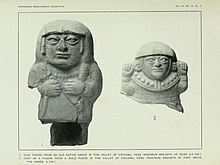
| Part of a series on |
| Anthropology of religion |
|---|
 |
| Social and cultural anthropology |
| Part of a series on the |
| Paranormal |
|---|
Supernatural refers to phenomena or entities that are beyond the laws of nature.[1] The term is derived from Medieval Latin supernaturalis, from Latin super- (above, beyond, or outside of) + natura (nature).[1] Although the corollary term "nature" has had multiple meanings since the ancient world, the term "supernatural" emerged in the Middle Ages[2] and did not exist in the ancient world.[3]
The supernatural is featured in folklore and religious contexts,[4] but can also feature as an explanation in more secular contexts, as in the cases of superstitions or belief in the paranormal.[5] The term is attributed to non-physical entities, such as angels, demons, gods and spirits. It also includes claimed abilities embodied in or provided by such beings, including magic, telekinesis, levitation, precognition and extrasensory perception.
The supernatural is hypernymic to religion. Religions are standardized supernaturalist worldviews, or at least more complete than single supernaturalist views. Supernaturalism is the adherence to the supernatural (beliefs, and not violations of causality and the physical laws).
- ^ a b "Definition of SUPERNATURAL". Archived from the original on 2020-02-07. Retrieved 2019-12-11.
- ^ Cite error: The named reference
Bartlettwas invoked but never defined (see the help page). - ^ Cite error: The named reference
Oxfordwas invoked but never defined (see the help page). - ^ Pasulka, Diana; Kripal, Jeffrey (23 November 2014). "Religion and the Paranormal". Oxford University Press blog. Oxford University Press. Archived from the original on 15 February 2015. Retrieved 24 October 2018.
- ^ Halman, Loek (2010). "8. Atheism And Secularity In The Netherlands". In Phil Zuckerman (ed.). Atheism and Secularity Vol.2: Gloabal Expressions. Praeger. ISBN 9780313351839.
"Thus, despite the fact that they claim to be convinced atheists and the majority deny the existence of a personal god, a rather large minority of the Dutch convinced atheists to believe in a supernatural power!" (e.g. telepathy, reincarnation, life after death, and heaven)